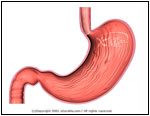|
|
 |

Normal |

Abnormal |
| |
- Duodenitis is basically inflammation and irritation of the wall of the first part of the small intestine.
- Duodenitis is a
diagnosis made by endoscopy, in which a camera is inserted into the stomach and first part of the intestine. It can cause abdominal pain or bleeding from the intestine. It is similar to ulcers but less severe. Treatment is similar to ulcers.
|
 |
- Symptoms are similar to Peptic Ulcer Disease or duodenal ulcers.
- There can be stomach pain, bleeding from the intestine, nausea, vomiting, loss of appetite, and, rarely, intestinal obstruction.
- Please see the section on "Peptic Ulcer Disease" for more details.
|
 |
- Duodenitis is usually due to things that irritate the wall of the intestine.
- For example, aspirin, nonsteroidal anti-inflammatory agents (NSAIDs), and high acid secretion can all lead to Duodenitis.
- Please see the section on "Peptic Ulcer Disease" for more details.
|
 |
- Diagnosis is usually made by endoscopy. The doctor will be able to look into the first part of the small intestine (called the duodenum) and see any abnormalities.
- Usually, there may be some redness and nodules in the wall of the small intestine.
- Sometimes, it can be more severe and there may be shallow, eroded areas in the wall of the intestine, along with some bleeding. This is slightly more severe than simple Duodenitis and is sometimes called erosive Duodenitis.
- Please see the section on "Peptic Ulcer Disease" for more details.
|
 |
- Risk factors include taking aspirin, nonsteroidal anti-inflammatory agents, or having a disease (such as Zollinger-Ellison Syndrome) that causes excess acid production by the stomach.
- Please see the section on "Peptic Ulcer Disease" for more details.
|
 |
- The first step in the treatment of this condition is to stop all medications that can make things worse. Therefore, aspirin and nonsteroidal anti-inflammatory drugs must be discontinued if possible.
- Also, medications such as H2 receptor blockers (for example ranitidine or cimetidine) or proton pump inhibitors (for example omeprazole) can be given to help reduce the acid secretion by the stomach.
- Conditions such as Zollinger-Ellison Syndrome that can cause the problem must be treated appropriately.
- Please see the section on "Peptic Ulcer Disease" for more details.
|
 |
- Intestinal bleeding
- Intestinal perforation
- Nausea
- Vomiting
- Abdominal pain
- If the inflammation is severe, it can lead to intestinal obstruction. However, this is fairly uncommon.
- Please see the section on "Peptic Ulcer Disease"
for more details.
|
 |
-
Seek medical
attention. You may have to see a gastroenterologist so
that an endoscopy can be
performed.
|
 |
- Avoid prolonged use of aspirin or nonsteroidal anti-inflammatory medications.
- Please see the section on "Peptic Ulcer Disease"
for more details.
|
| | |
If you want your friend to read or know about this article, Click here
 |
|
|

